The 1 decision every InfoFi creator must make
The fastest way to lose your audience is to fake it for rewards.
I used to post for Yaps, and it nearly killed my brand.
With every major airdrop in the Kaito ecosystem, it brings a familiar pattern:
Accounts flexing their yapper allocations
Onchain users frustrated with their allocations
The current state of InfoFi rewards yappers who generate the most views for the project, rather than actual value or usage.
And I probably look like a fool for missing out on these opportunities.
But InfoFi is still in its early stages, and I’m certain that changes will come.
In the end, creators need to make the decision whether they’re here for quick profits or building something that lasts for the long-term:
The creator dilemma
Every InfoFi airdrop comes with a choice:
Cash out now with whatever social capital you own
Play the long-term game and focus on building trust by consistently providing value
There’s no denying the fact that some need the money now, and InfoFi presents the best opportunity for profits.
But what matters most is how you talk about that project.
Right now, low-quality content is winning.
Writing a post and adding a project’s name at the end was all we needed to get a good allocation.
It was so easy for anyone with a sizeable audience to rank on any leaderboard:
All they needed was to talk about the new leaderboard and potential rewards.
But Kaito has now made the change to avoid awarding mindshare to these posts:
But it’s all up to the project to decide what kind of behaviour they want to incentivise.
@waleswoosh introduced the concept of mindful monetisation, which I believe is very applicable in this state of InfoFi.
There are so many opportunities now to make quick bucks, but they hurt your long-term growth:
Your brand is your most valuable asset
If you’re looking to play the long-term game, your social footprint is the most important currency.
Beyond just Kaito, the ecosystem is flooded with mindshare leaderboards:
Cookie Snaps
Galxe Starboard
Fantasy Clout
Wallchain Quacks
Each one incentivises creators to talk about the project, but often without depth or authenticity.
Just because there’s a leaderboard, it doesn’t mean you have to talk about the project.
Quoting from this article from @beast_ico:
If you are not genuinely interested in a project, I’m of the opinion you shouldn’t be trying to create incentivized content for it. There are a couple of reasons for this, but it boils down to this: your audience can tell when you’re actually interested in something and when you’re just churning sht out. CT is full of LARPs and posers and fakers - people want authenticity. Faking interest is obvious and it will cost you valuable audience in the long run.
I’ve been guilty of this too in the early days of Kaito Yaps, where I constantly talked about Yaps because it was popular.
And I knew I could get lots of engagement through it.
But my audience could see it and complained how they’re tired of yet another Yaps post I made.
That made me realise that chasing rewards without authenticity dilutes my brand.
And I’m now only talking about things that I’ve actually done (or plan to do).
Authenticity is the core pillar to win the long-term InfoFi game, because AI is coming for us:
Grinding will become irrelevant
Some accounts earned high InfoFi allocations by grinding out posts and replies.
Just like how many spammed messages on Discord to rank up and get certain roles.
But I see this becoming irrelevant in no time:
AI bots can do this better and faster than any of us can by ourselves.
With InfoFi, everything becomes too inauthentic because no one dares to say anything bad about a project (for fear of losing their leaderboard rank).
So every post trends toward commodity content:
There’s zero personality, and I can literally copy someone else’s post and take it as my own.
These accounts won’t stand out in the sea of noise because AI can generate this type of content at a larger scale.
But here’s what will instead:
Be different by being yourself
The only way to differentiate yourself is with your brand:
Being your authentic self helps others to resonate with your messages, especially when they feel like you’re talking directly to them.
Inject your experiences, opinions, and insights into every piece so you seem like a real human.
I chose not to talk about Newton because I couldn’t find many things to talk about a DCA bot.
And I’m perfectly fine with missing out on rewards from projects that I don’t use.
But I liked how Newton rewarded thought leaders in AI and other sectors related to Newton:
This shows that you don’t have to just talk about the project itself and spam the timeline further:
You can talk about topics you’re truly interested in and still profit along the way.
Just like farming, you will be burnt out if you’re only talking about what’s popular instead of topics that you’re passionate about.
InfoFi currently rewards vanity metrics, but I believe that quality filters will be implemented soon.
And here’s what I see InfoFi will evolve to:
The future is onchain + social
InfoFi has nothing at stake, so you can choose to talk about anything without repercussions.
But I see onchain reputation as another layer for identifying real users.
The only way to Sybil-proof your identity for future airdrops is to say what you do onchain.
Both onchain and social footprint can be easily gamed by themselves.
But when combined together, it creates an effective profile that Sybils can’t replicate.
Projects are starting to see the value of both, including Abstract:
And I believe that others will start to adopt this too.
Eventually, your leaderboard ranking means nothing if you can’t prove that you’re a real user (by using the product onchain).
I shared more thoughts below on why we need both to succeed:
The 30-day challenge to go from zero to Signal Creator
Want to capture the next wave of airdrops? You need both onchain and social reputation.
Stop wasting hours on low-value tasks and start building habits and systems that projects will reward with bigger airdrops.
Build the foundations for a reputable brand in just 30 days with one actionable tip you can implement each day.
It’s time to stop burning out on low-value tasks:





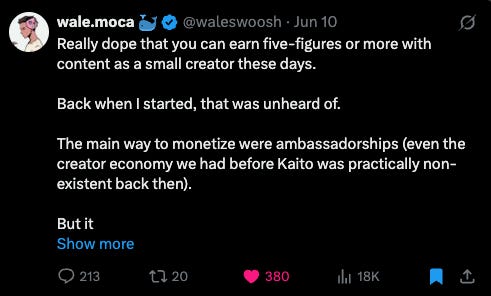
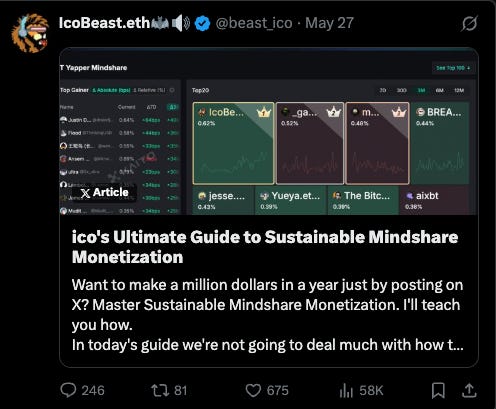
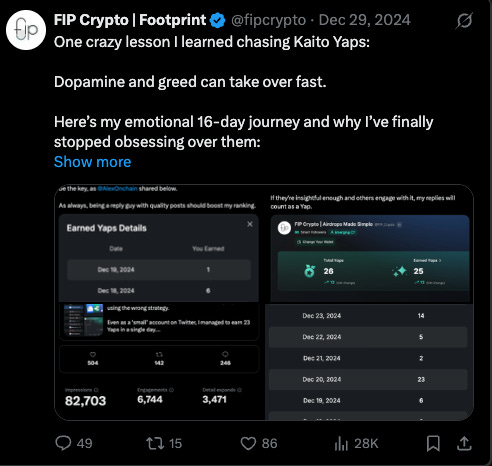


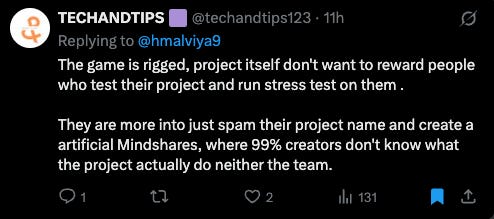
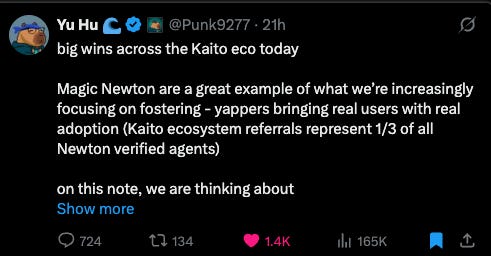
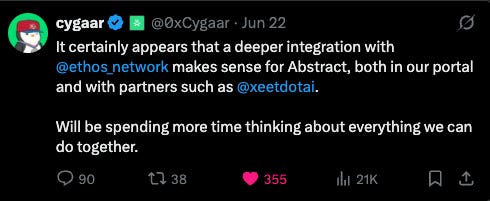
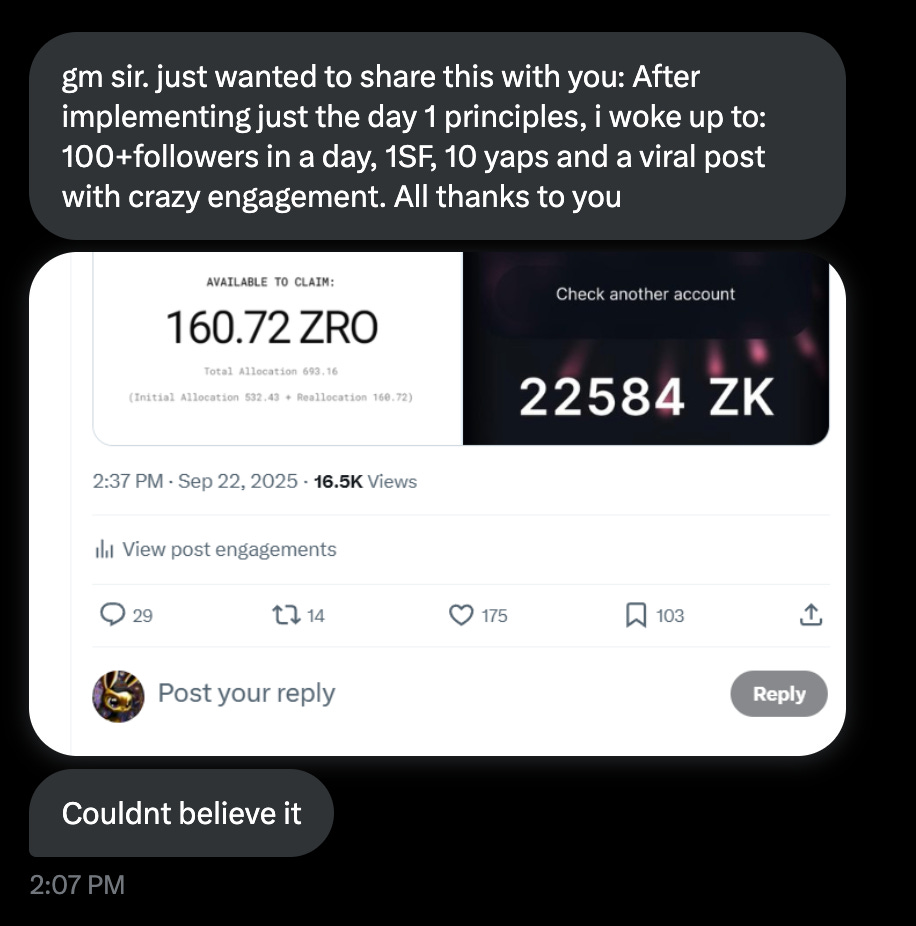
Really enjoying your insights on the creator economy and the plague called InfoFi right now.
I’ve had similar thoughts and simply can not motivate myself to spam so much and annoy my audience with pointless posts. You simply have to be annoying or poor to do that all the time.